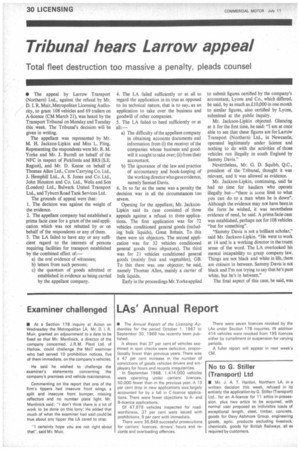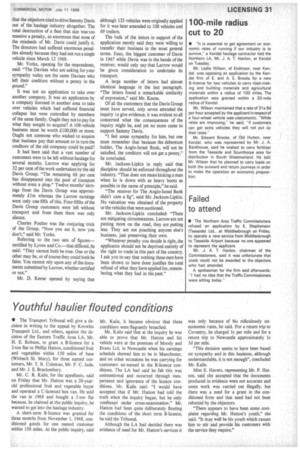Tribunal hears Larrow appeal
Page 32

Page 33

If you've noticed an error in this article please click here to report it so we can fix it.
Total fleet destruction too massive a penalty, pleads counsel
• The appeal by Larrow Transport (Northern) Ltd., against the refusal by Mr.
D. I. R. Muir, Metropolitan Licensing Authority, to grant 108 vehicles and 69 trailers on A-licence (CM March 21), was heard by the Transport Tribunal on Monday and Tuesday this week. The Tribunal's decision will be given in writing.
The appellant was represented by Mr.
M. H. Jackson-Lipkin and Miss L. Fling. Representing the respondents were Mr. R. M. Yorke and Mr. J. Burrell on behalf of the NFC in respect of Pickfords and BRS (S.E. Region), and Mr. D. Keene on behalf of Thomas Allen Ltd., Crow Carrying Co. Ltd., J. Hemphill Ltd., A. S. Jones and Co. Ltd., John Houston and Co. Ltd., Wells and Son (London) Ltd., Bulwark United Transport Ltd., and Tyburn Road Tank Services Ltd.
The grounds of appeal were that: 1. The decision was against the weight of the evidence.
2. The appellant company had established a prima facie case for a grant of the said application which was not rebutted by or on behalf of the respondents or any of them.
3. The LA failed to have any or any sufficient regard to the interests of persons requiring facilities for transport established by the combined effect of:—
a) the oral evidence of witnesses; b) letters from such persons; c) the quantum of goods admitted or established in evidence as being carried by the appellant company. 4. The LA failed sufficiently or at all to regard the application in its true as opposed to its technical nature, that is to say, as an application to take over the business and goodwill of other companies.
5. The LA failed to heed sufficiently or at all:—
a) The difficulty of the appellant company in obtaining accounts documents and information from (i) the receiver of the companies whose business and goodwill it sought to take over; (ii) from their accountant.
b) The ignorance of the law and practice of accountancy and book-keeping of the working director who gave evidence, namely Samuel Davis.
6. In so far as the same was a penalty the decision was in all the circumstances too severe.
Opening for the appellant, Mr. JacksonLipkin said its case consisted of three appeals against a refusal to three applications. The first application was for 72 vehicles conditioned general goods (including bulk liquids), Great Britain. To this there were six objectors. The second application was for 32 vehicles conditioned general goods (two objectors). The third was for 21 vehicles conditioned general goods (mainly fruit and vegetables), GB. To this there was one objector, he said, namely Thomas Allen, mainly a carrier of bulk liquids.
Early in the proceedings Mr. Yorke applied to submit figures certified by the company's accountant, Lyons and Co., which differed, he said, by as much as £10,000 in one month to similar figures, also certified by Lyons, submitted at the public inquiry.
Mr. Jackson-Lipkin objected. Glancing at it for the first time, he said: "I am at once able to see that these figures are for Larrow Transport (Northern) Ltd., in Newcastle, operated legitimately under licence and nothing to do with the activities of those vehicles run illegally in south England by Sammy Davis."
Nevertheless, Mr. G. D. Squibb, Q.C., president of the Tribunal, thought it was relevant, and it was allowed as evidence.
Mr. Jackson-Lipkin, continuing, said he had no time for hauliers who operate illegally but—"there is some limit to what you can do to a man when he is down". Although the evidence may not have been in the form he wished, it was nevertheless evidence of need, he said. A prima facie case was established, perhaps not for 108 vehicles "but for something".
"Sammy Davis is not a brilliant scholar," said Mr. Jackson-Lipkin. "He went to work at 14 and is a working director in the truest sense of the word. The LA overlooked his mental incapability to grasp company law. Things are not black and white in life, there are colours in between. Sammy Davis is not black and I'm not trying to say that he's pure white, but he's in between."
The final aspect of this case, he said, was that the objectors tried to drive Sammy Davis out of the haulage industry altogether. The total destruction of a fleet that size was too massive a penalty, so enormous that none of the misdeeds of Mr. Davis could justify it. The directors had suffered enormous penalties already because they had not run a single vehicle since March 12 1969.
Mr. Yorke, opening for the respondents, said: -The Davises who are asking for your sympathy today are the same Devises who left their creditors without a penny in the pound."
It was not an application to take over another company. It was an application by a company licensed in another area to take over vehicles which had suffered financial collapse but were controlled by members of the same family. Ought they not to pay for what they sought to acquire? A 108-vehicle business must be worth £100,000 or more.
Ought not someone who wished to acquire that business pay that amount so in turn the creditors of the old company could be paid? It had been said that a vast number of customers were to be left without haulage for several months. Larrow was applying for 32 per cent of the work undertaken by the old Davis Group. "The remaining 68 per cent has disappeared into the pool of transport without even a plop." Twelve months' earnings from the Davis Group was approxi mately £1m whereas the Larrow earnings were only one-fifth of this. Four-fifths of the Davis Group customers were left without transport and from them there was only silence.
Charles Poulter was the conjuring trick of the Group. "Now you sec it. now you don't,said Mr. Yorke.
Referring to the two sets ot figures— certified by Lyons and Co.—that differed, he said: "They cannot both be true. One or the other may be, or of course they could both be false. You cannot rely upon any of the documents submitted by Larrow, whether certified or not."
Mr. D. Keene opened by saying that although 125 vehicles were originally applied for it was later amended to 108 vehicles and 69 trailers.
The bulk of the letters in support of the application merely said they were willing to transfer their business in the most general terms. Esso, the biggest customer of Davis in 1967 while Davis was in the hands of the receiver, would only say that Larrow would be given consideration to undertake its transport.
A large number of letters had almost identical language in the last paragraph. "The letters found a remarkable similarity of expression," said Mr. Keene.
Of all the customers that the Davis Group must have served, only seven attended the inquiry to give evidence; it was evident to all concerned what the consequences of the inquiry might be, and yet no more came to support Sammy Davis.
"I feel some sympathy for him, but one must remember that because the debenture holder, The Anglo-Israel Bank, will not be satisfied. the creditors will not get a penny,he concluded.
Mr. Jackson-Lipkin in reply said that discipline should be enforced throughout the industry. "That does not mean kicking a man when he is down with as heavy boots as possible in the name of principle," he said.
"The receiver for The Anglo-Israel Bank didn't care a fig", said Mr. Jackson-Lipkin. No valuation was obtained of the property or the vehicles that were auctioned.
Mr. Jackson-Lipkin concluded: "There are mitigating circumstances. Larrow are not putting more on the road, they are putting less. They are not poaching anyone else's business, just preserving their own.
"Whatever penalty you decide is right, the applicants should not be deprived entirely of the right to trade in this part of the country. I ask you to say that nothing these men have been shown to have done justifies the total refusal of what they have applied for, remembering what they had in the past."












































































































